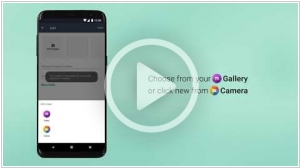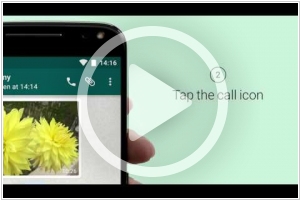WhatsApp is #1 in Top 10 Business Messaging platforms
WhatsApp Messenger is a cross-platform mobile messaging app which allows you to exchange messages without having to pay for SMS. WhatsApp Messenger is available for iPhone, BlackBerry, Android, Windows Phone and Nokia and yes, those phones can all message each other! Because WhatsApp Messenger uses the same internet data plan that you use for email and web browsing, there is no cost to message and stay in touch with your friends.
Positions in ratings
#1 in Top 10 Business Messaging platforms
#2 in Top 14 Video Calling apps
Alternatives
The best alternatives to WhatsApp are: Discord, Telegram, Google Chat, Facebook Messenger, Signal, Viber, WeChat, iMessage
Latest news about WhatsApp
2023. WhatsApp launches its native macOS app
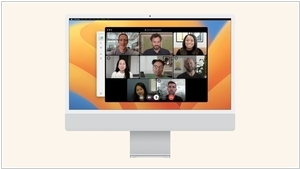
WhatsApp has introduced a new native Mac app, enabling users to engage in video calls with a maximum of eight participants and audio calls with up to 32 individuals. The redesigned app is tailored to Mac users, facilitating increased productivity on larger screens. Notably, users can seamlessly share files through drag-and-drop functionality in chats and access a more extensive chat history. After a period of testing, WhatsApp released the app in public beta earlier this year, making it available to users with Apple Silicon systems and macOS 11 Big Sur or later.
2023. WhatsApp introduces a new Windows client with better calling features
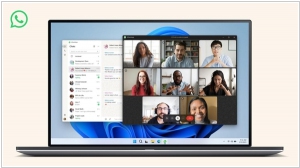
WhatsApp has unveiled an upgraded Windows client that boasts enhanced calling features and improved performance. With the latest version, users can stay connected even when their phone is inactive, thanks to multi-device synchronization. The desktop app now also enables group video calls for up to eight people and audio calls for up to 32 participants, on par with the mobile application. Furthermore, WhatsApp plans to expand the number of people allowed in a group call. In light of its multi-device linking capability that allows one account to be used across various devices, the company has been focused on enhancing its desktop experience.
2022. WhatsApp's new Communities tool sounds a lot like Slack
WhatsApp has introduced a new feature called "Communities," which enables users to create groups within the app for specific organizations or groups, such as schools or apartment buildings. These communities will have sub-groups where members can discuss specific topics, and administrators will have the ability to send announcements to all members. The concept of communities on WhatsApp bears resemblance to Slack, a popular messaging platform in the digital workplace. Along with the introduction of communities, WhatsApp is implementing some additional changes to its Groups feature that also resemble Slack's functionality. Notably, users will now be able to express themselves through emoji reactions, and audio calls will accommodate up to 32 participants. The file sharing size limit has been increased to 2 GB, and group administrators have the ability to delete messages. These updates bring enhanced functionality and versatility to the WhatsApp platform.
2021. WhatsApp brings its Business API to the cloud to speed adoption
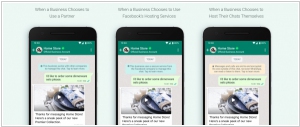
WhatsApp is introducing a new version of its WhatsApp Business API, which will now be hosted on Facebook's infrastructure in the cloud. According to the company, this shift will significantly reduce the integration setup time from weeks to just minutes. As a result, businesses can swiftly transition to WhatsApp's API platform and effectively communicate with their opted-in customers. Over the past few years, WhatsApp has been expanding its Business API to create a significant revenue stream from its otherwise free messaging service. Presently, businesses pay WhatsApp on a per-message basis, with rates varying depending on the number of messages sent and the region. Currently, numerous large enterprises, including Vodafone, Coppel, Sears Mexico, BMW, KLM Royal Dutch Airlines, Iberia Airlines, Itau Brazil, iFood, and Bank Mandiri, have already adopted the existing API (non-cloud based) to enhance their operations.
2021. WhatsApp adds voice and video calling to desktop app

Support for voice and video calling is being introduced to the desktop app of WhatsApp for Mac and Windows. Initially, this feature will only be available for one-to-one calls, but the company plans to expand it to include group voice and video calls in the future. The video calls are designed to work seamlessly in both portrait and landscape orientation. Additionally, the desktop client will always remain on top of other windows, ensuring that video chats are never lost amidst a browser tab or a stack of open windows. WhatsApp conducted tests for this feature with a small group of desktop users last year.
2020. WhatsApp finally launches payments
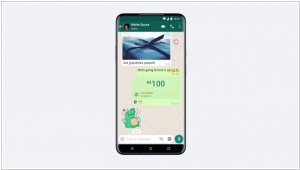
WhatsApp has made an announcement that users in Brazil will have the privilege of being the first to send and receive money through its messaging app. This will be made possible by utilizing Facebook Pay, the payments service launched by WhatsApp's parent company, Facebook, last year. The payments service is currently free for consumers, meaning there are no commission fees involved. However, businesses will be required to pay a 3.99% processing fee to receive payments. To complete transactions, users will need to enter a six-digit PIN or use their fingerprint. To use the service, you need to connect your WhatsApp account with your Visa or Mastercard credit or debit card. Initial local partners for this service include Banco do Brasil, Nubank, and Sicredi. Additionally, Cielo, a payments processor, is collaborating with WhatsApp to facilitate transactions. The company stated, "We have created an open model to allow for the inclusion of more partners in the future."
2019. WhatsApp adds business catalogs
WhatsApp is enhancing its business app by introducing a new feature called "catalogs." This feature enables businesses to present and share their products and services with potential customers. Interested customers can explore product photos, view prices, and read descriptions to make informed purchase decisions. These catalogs function as convenient mobile storefronts on WhatsApp, eliminating the need for a dedicated web page. Business owners can effortlessly create catalogs by accessing the Catalog option in the app's settings, uploading product photos, and providing relevant details, including optional product or service codes.
2019. WhatsApp Business app added customer service features to its desktop and web apps
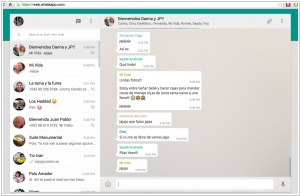
About a year ago, WhatsApp launched its dedicated app tailored for small businesses. Now, the company is enhancing the usability of the app on desktop and web platforms by incorporating several popular features that were previously exclusive to mobile devices. These additions encompass tools for organizing and filtering chats, as well as facilitating prompt responses to customer inquiries. One such feature is Quick Replies, which enables businesses to swiftly address common customer questions using pre-written responses. It joins a suite of other customer service features, including automated greeting messages triggered when a customer contacts the business account, and scheduled away messages for instances when immediate responses are not feasible.
2018. WhatsApp launched encrypted group video calls
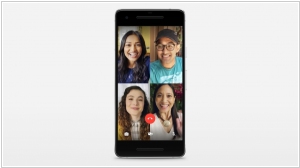
WhatsApp introduced video calling in 2016, initially limited to two participants. However, in a recent update, the app has expanded its video calling support to accommodate a total of four participants. While this increase may appear modest when compared to other services, such as Facebook Messenger allowing up to 50 participants or Skype supporting 25 participants, it presents unique challenges for WhatsApp. The app prioritizes end-to-end encryption for all messages, including video calls, by default. Additionally, WhatsApp must ensure that new features are optimized for users with slower internet connections and older devices. Balancing these factors while maintaining the app's security and performance is crucial for WhatsApp's video calling capabilities.
2018. WhatsApp adds Telegram-like channels
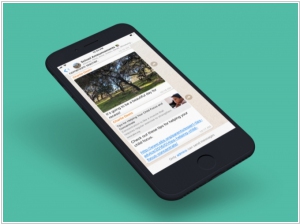
WhatsApp has introduced a new feature that allows group chat administrators to restrict message sending privileges to only admins. This addition proves beneficial for individuals and organizations utilizing WhatsApp as a platform for disseminating mass updates, while simultaneously reducing unnecessary noise and clutter. This functionality serves as an alternative to Telegram's channels, where only administrators possess the ability to broadcast messages. Such a format proves ideal for corporate micro-blogs seeking to deliver company news, discount offers, or announcements to a significant number of customers.
2018. WhatsApp updates group chats to fight Telegram
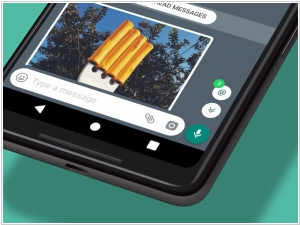
WhatsApp has introduced a range of new features for Groups on both iOS and Android. These updates empower group admins to set a description for their community and manage the Groups settings by determining who can make changes. Additionally, users can now catch up on group discussions by accessing a dedicated section that displays messages where they were mentioned. The search functionality has also been enhanced, enabling users to easily find specific individuals within the group. These improvements to WhatsApp Groups aim to strengthen its competitiveness against platforms like Telegram, which have gained significant popularity for chat groups, particularly in the realm of cryptocurrency. While both apps offer admin controls, the focus now lies in streamlining the experience of navigating these dynamic chat forums.
2018. WhatsApp launches its app for business
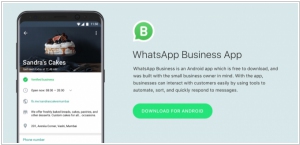
WhatsApp has recently unveiled its highly anticipated WhatsApp Business app in several markets, including Indonesia, Italy, Mexico, the U.K., and the U.S., as a preliminary step before its global release. Designed specifically for small businesses, this free Android app facilitates improved customer engagement and enables companies to establish an official presence on WhatsApp's platform. In essence, it serves as the WhatsApp equivalent of a Facebook Page. With the introduction of this new app, small businesses now have the opportunity to create their own WhatsApp Business profiles by providing essential details such as business descriptions, email addresses, physical addresses, and websites.
2017. WhatsApp launched business-accounts
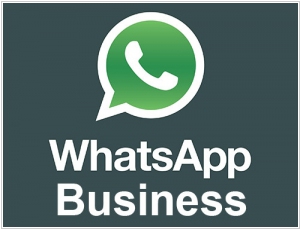
Messager WhatsApp, a messaging platform owned by Facebook, is currently conducting experiments to provide verified accounts to businesses. These business accounts will be marked with a green tick badge, similar to Viber, indicating that WhatsApp has verified their phone number as belonging to a business account. Additionally, WhatsApp will be launching a free app called WhatsApp Business, designed for small-to-medium sized businesses, although the specific features of the app have not been detailed. This enterprise solution will enable global companies to send valuable notifications to customers, such as flight updates, delivery confirmations, and other relevant information. At present, registration for a business account on WhatsApp is available only through invitation.
2017. WhatsApp enabled two-factor authentication for everyone
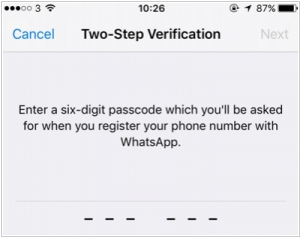
WhatsApp has introduced the option of two-factor verification for all of its extensive user base, exceeding one billion users. This security feature involves utilizing a passcode to authenticate your phone number, significantly reducing the chances of unauthorized access to a WhatsApp account. In response to concerns about user data sharing with the Facebook family of companies, WhatsApp assures users that providing an email address enables the ability to disable two-step verification in case the passcode is forgotten. It's important to note that two-step verification remains an optional feature. To activate it, ensure that you have the latest version of the WhatsApp application installed, access the Settings menu, navigate to Account, select Two-Step Verification, and enable the feature from there.
2016. WhatsApp launches video calls
Facebook-owned chat service WhatsApp is introducing video calling for its extensive user base of over 1 billion people worldwide across iOS, Android, and Windows Phone platforms. To utilize this new feature, WhatsApp users can tap the call button located in the top right corner of a conversation, triggering an overlay that prompts whether to initiate a voice or video call with the person they are currently chatting with, be it a friend or a family member. To start a video call, users simply need to select the "video call" option from this overlay. With the addition of video calling, WhatsApp is finally catching up to its competitors, such as Facebook's Messenger app, Skype, Apple's FaceTime, Viber, LINE, and Google's recently launched Duo, among others.
2016. WhatsApp launched desktop version for Mac and Windows

WhatsApp has released desktop clients for both Mac and Windows operating systems. Users who have previously utilized WhatsApp on their web browsers will notice that the software remains largely unchanged. The desktop application serves as an extension of the mobile app, ensuring that all messages are synchronized across devices. By offering desktop options, WhatsApp aims to cater to power users who heavily rely on the platform for work-related communications. This move strengthens its position in competition with other messaging services such as iMessenger, WeChat, and Skype. Furthermore, WhatsApp is currently in the testing phase for B2C (Business-to-Consumer) accounts, which could potentially become a new source of revenue for the platform, following the discontinuation of its annual 99 cent subscription fee.
2016. WhatsApp now supports full end-to-end encryption
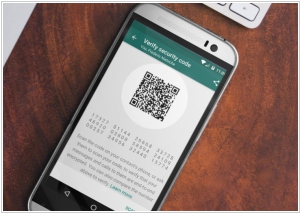
Facebook-owned messaging platform, WhatsApp, has successfully implemented robust end-to-end encryption across all its mobile applications. This encryption ensures that the content of communications remains secure and is not stored in plain text on WhatsApp's servers. Additionally, the company lacks the ability to decrypt users' messages, as it does not possess the encryption keys. Consequently, even if authorities request access through a warrant, WhatsApp cannot be compelled to provide messaging data. By collaborating with Open Whisper Systems, WhatsApp has integrated the highly regarded Signal Protocol for its end-to-end encryption. It is important to note that while default end-to-end encryption represents a significant security achievement for WhatsApp, not all communications sent through the app are automatically end-to-end encrypted. This functionality relies on all users updating to the latest software version.
2016. WhatsApp will go free and add features for business
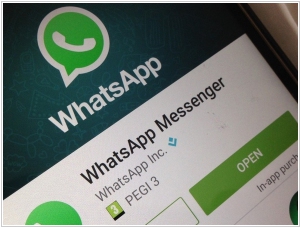
WhatsApp has made a significant announcement regarding its subscription fee, stating that it will be dropped, making the service free for all users. Furthermore, the company has clarified that it will not introduce third-party advertisements to its platform. Instead, WhatsApp intends to enhance user connections with businesses and organizations by introducing new features. These features could facilitate communication with banks to inquire about potentially fraudulent transactions or airlines to address flight delays, for example. WhatsApp plans to charge organizations and businesses for establishing channels to engage with users through the service. It is worth noting that Facebook acquired WhatsApp for $16 billion in February 2014. According to recent reports, WhatsApp currently boasts "nearly" 1 billion users, a milestone that Facebook CEO and co-founder Mark Zuckerberg has previously expressed as an opportunity for monetization.
2015. WhatsApp web client adds iOS support
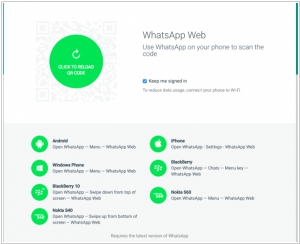
WhatsApp has expanded the platforms supported by its web app to include iOS. This means that iPhone users now have the capability to synchronize their accounts and chats with WhatsApp Web. Initially, when WhatsApp Web was launched in January, it supported Android, Windows Phone, and BlackBerry but did not include iOS due to limitations imposed by the Apple platform. WhatsApp, which was acquired by Facebook in 2012 for $19 billion, reported having 800 million monthly active users in April. However, it faces strong competition from messaging services like WeChat and KakaoTalk, particularly in key Asian markets such as China and South Korea. Another prominent competitor is Line, which currently holds the leading position in Japan, Taiwan, and Thailand as a messaging service.
2015. WhatsApp launches web browser version
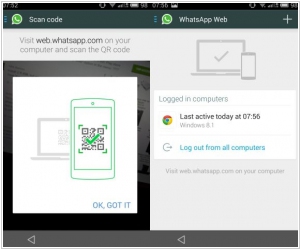
The widely-used global mobile messaging app WhatsApp has introduced a web-based version of its service. Initially, the web application is limited to users with WhatsApp accounts on Android, Windows, and, curiously, Blackberry devices. Unfortunately, iPhone owners are currently unable to access WhatsApp's desktop client. Additionally, the web browser version of WhatsApp is currently compatible only with Google Chrome. However, the app enjoys a predominantly international user base, and considering that Android dominates the global market, this limitation is relatively manageable for the company.




